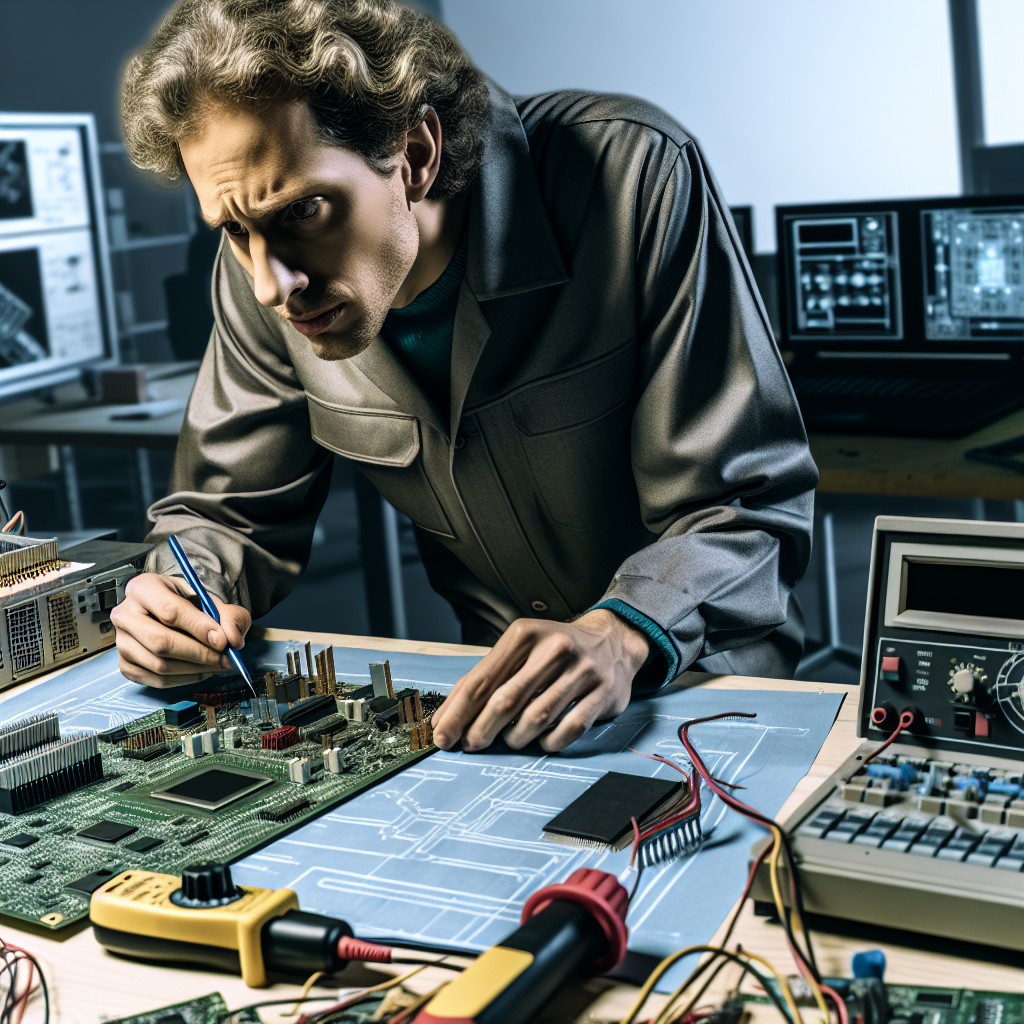Introduction:
Hardware engineers play a crucial role in the technological industry by designing, developing, and testing various hardware components.
Today, these engineers face a myriad of challenges that impact their work and the products they create.
In this blog post, we will explore some of the key challenges encountered by hardware engineers in today’s fast-paced and dynamic environment.
Increasing Complexity:
One of the primary challenges faced by hardware engineers is the increasing complexity of hardware designs.
With the demand for smaller, faster, and more powerful devices, engineers must navigate intricate designs and architectures to meet consumer expectations.
Rapid Technological Advancements:
Hardware engineers must keep pace with the rapid advancements in technology, which often outpace traditional learning methods.
Keeping up with new technologies and tools is essential to staying relevant in the field.
Cost Constraints:
Meeting cost constraints while delivering high-quality hardware products is a significant challenge for engineers.
Balancing performance, cost, and time-to-market pressures requires innovative solutions and strategic decision-making.
Interdisciplinary Collaboration:
Hardware engineers often collaborate with professionals from various disciplines, such as software developers and industrial designers.
Effective communication and collaboration across teams with different expertise can be challenging but are essential for successful product development.
Rapid Technological Advancements:
Hardware engineers face challenges due to rapid advancements in technology.
Continuous learning and skill development are necessary to keep up with the latest trends.
There is pressure on engineers to innovate and create cutting-edge technology.
Hardware engineers today are confronted with a rapidly evolving technological landscape that poses significant challenges.
The speed at which new advancements are made in the field of hardware engineering requires professionals to be on their toes at all times.
As technology continues to progress at an exponential rate, engineers must adapt quickly to stay relevant and competitive in the industry.
One of the key challenges that hardware engineers face is the need for continuous learning and skill development.
With new technologies emerging constantly, engineers must invest time and effort into updating their knowledge and acquiring new skills to keep up with the latest trends.
This requires a proactive approach to professional development and a willingness to embrace lifelong learning.
Transform Your Career Today
Unlock a personalized career strategy that drives real results. Get tailored advice and a roadmap designed just for you.
Start NowMoreover, hardware engineers are under immense pressure to innovate and create cutting-edge technology.
In a highly competitive market, companies are constantly looking for groundbreaking solutions that can give them a competitive edge.
This means that engineers are expected to push the boundaries of what is possible and deliver innovative hardware designs that meet the demands of the market.
The challenges faced by hardware engineers today are significant, but not insurmountable.
By staying abreast of the latest technological advancements, investing in continuous learning, and embracing innovation, engineers can overcome these challenges and thrive in a rapidly changing industry.
Market Competition:
Hardware engineers face relentless competition in the market.
Rival companies constantly strive to outperform each other.
Staying ahead in design, performance, and cost is crucial.
Competitors’ innovations push engineers to think creatively.
Need for Innovation:
Continuous innovation is essential to meet consumer demands.
Creating cutting-edge products sets companies apart.
Being innovative attracts new customers and retains existing ones.
Investing in research and development is non-negotiable.
Market Research:
Market research helps hardware engineers understand consumer preferences.
Knowing what customers want guides product development.
Being informed about trends ensures relevance in the market.
Adapting to changes is crucial for sustained success.
Explore Further: From Classroom to Boardroom: Cyber Analyst Career Progression
Cost Constraints:
Hardware engineers today face numerous challenges.
Showcase Your Business Today
Reach thousands of readers actively exploring professional services. Publish your business profile and grow your audience now.
Publish NowOne of the most significant is cost constraints.
Working within budget limitations in hardware design can be daunting.
This task requires careful consideration and strategic planning.
Addressing the Challenges:
- Hardware engineers are under constant pressure to minimize costs without compromising on quality.
- This means finding cost-effective solutions that meet the required specifications and standards.
- It is essential to strike a balance between cutting costs and ensuring the reliability and efficiency of the hardware.
Importance of Cost-effective Solutions:
Cost-effective solutions are crucial for hardware engineers to stay competitive.
They must meet the demands of consumers.
By implementing cost-effective strategies, engineers can optimize resources.
This maximizes efficiency in the design and production process.
Efficient Resource Management:
- Efficient resource management is key to overcoming cost constraints in hardware design.
- Engineers need to carefully allocate resources such as materials, labor, and time.
- By leveraging technology and automation tools, engineers can streamline processes.
Navigating cost constraints is a constant challenge for hardware engineers today.
By prioritizing cost-effective solutions and efficient resource management, engineers can overcome these challenges.
They can continue to innovate in the ever-evolving field of hardware design.
Explore Further: Cyber Security Analysts: The Frontline of U.S. Digital Defense
Challenges Faced by Hardware Engineers
One of the major challenges faced by hardware engineers today is the complex design requirements in developing innovative hardware systems to meet user demands.
Designing complex hardware systems requires a high level of expertise in areas such as circuit design, signal processing, and power management.
- Hardware engineers must possess a deep understanding of circuit design principles to ensure the functionality and efficiency of the hardware system.
- Signal processing expertise is crucial in designing hardware systems that can accurately interpret and process various types of signals.
- Effective power management is essential to optimize energy efficiency and prolong the battery life of hardware devices.
Additionally, hardware engineers need strong problem-solving skills to tackle design challenges that may arise during the development process.
Having the ability to analyze complex problems, identify potential solutions, and implement effective strategies is key to overcoming design obstacles.
Furthermore, hardware engineers must have the creativity and innovation to think outside the box and come up with unique design solutions.
By staying updated on the latest technological advancements and design trends, hardware engineers can address user demands effectively.
Uncover the Details: Real Stories: A Day in the Life of a U.S. Cyber Analyst
Integration of Hardware and Software:
One of the biggest challenges faced by hardware engineers today is the integration of hardware and software components in modern technology.
This process involves combining physical components with code that controls their behavior, which can be complex and time-consuming.
- Collaboration between hardware and software engineers is crucial in overcoming these challenges.
- Having a deep understanding of both hardware and software systems is essential for successful integration.
- Testing is a critical step in the integration process.
- Communication is key in ensuring that hardware and software components work seamlessly together.
- As technology continues to advance, the integration of hardware and software will only become more complex.
Integrating hardware and software components poses significant challenges for hardware engineers today.
Collaboration, understanding of both systems, thorough testing, effective communication, and staying updated on technology trends are essential to overcoming these challenges.
Delve into the Subject: Networking in the USA: Tips for Aspiring Cyber Analysts

Environmental Concerns:
Designing hardware systems that are environmentally friendly is a significant challenge for hardware engineers.
Reducing energy consumption in hardware design is crucial for minimizing the environmental impact of technology.
Electronic waste poses a major challenge as hardware becomes obsolete and disposed of improperly.
Sustainable design practices in hardware engineering are necessary to promote a greener and more eco-friendly approach.
- Designing hardware systems that are environmentally friendly is a significant challenge for hardware engineers.
- Reducing energy consumption in hardware design is crucial for minimizing the environmental impact of technology.
- Electronic waste poses a major challenge as hardware becomes obsolete and disposed of improperly.
- Sustainable design practices in hardware engineering are necessary to promote a greener and more eco-friendly approach.
Testing and Quality Assurance:
Hardware engineers face numerous challenges when it comes to ensuring the quality and reliability of hardware systems.
This is a critical aspect of their work that requires attention to detail and thorough testing procedures.
- One of the main challenges is the complexity of hardware systems, which often consist of numerous interconnected components that must function flawlessly together.
- Testing these systems thoroughly to ensure that all components work together seamlessly can be a time-consuming and resource-intensive process.
- Another challenge is the need for rigorous testing procedures to identify any potential hardware defects or issues before they impact the system’s performance.
- Quality assurance measures are essential to ensure that the hardware meets the required standards and specifications for reliability and performance.
Continuous testing and improvement are necessary to meet industry standards and keep up with advancements in technology.
This ongoing process helps hardware engineers identify and address any issues that may arise during the development and manufacturing stages.
Implementing a robust quality assurance system is crucial to prevent costly recalls or repairs down the line.
Catching and addressing issues early on can save time and resources in the long run.
Key points to consider:
- Developing comprehensive testing procedures that cover all aspects of the hardware system.
- Implementing strict quality control measures throughout the design and manufacturing processes.
- Utilizing advanced testing tools and technologies to streamline the testing process and improve accuracy.
- Investing in continuous training and development for hardware engineers to stay updated on the latest testing methods and technologies.
Testing and quality assurance play a crucial role in ensuring the reliability and performance of hardware systems.
By addressing these challenges effectively, hardware engineers can deliver high-quality products that meet the needs and expectations of users in today’s competitive market.
Main Challenges Faced by Hardware Engineers Today
Hardware engineers face challenges such as rapid technological advancements and increasing complexity.
Adaptability in the Face of Change
To overcome these challenges, hardware engineers need to be adaptable and open to learning new technologies.
Importance of Innovation
Innovation is crucial for hardware engineers to stay competitive and relevant in the fast-paced tech industry.
Collaboration for Success
Collaborating with colleagues and other professionals is key to solving complex hardware engineering problems effectively.
Conclusion
Hardware engineers today face challenges due to rapid advancements in technology and increasing complexity.
Showcase Your Business Today
Reach thousands of readers actively exploring professional services. Publish your business profile and grow your audience now.
Publish NowAdaptability, innovation, and collaboration are essential for overcoming these challenges.
It is important for hardware engineers to stay updated on industry trends and continuously learn to succeed in this ever-evolving field.
Additional Resources
What are the challenges faced by computer engineers today? – Quora
Hardware Engineer’s Biggest Challenges
[E-Books for Sale]
The Big Book of 500 High-Paying Jobs in America: Unlock Your Earning Potential
$19.99 • 500 High-Paying Jobs • 330 pages
Explore 500 high-paying jobs in America and learn how to boost your career, earn more, and achieve success!
See All 500 High-Paying Jobs of this E-Book
1001 Professions Without a Degree: High-Paying American Jobs You Can Start Now
$19.99 • 1001 Professions Without a Degree • 174 pages
Discover 1001 high-paying jobs without a degree! Unlock career tips, skills, and success strategies for just $19.99!




